Interview with Lavie Tidhar (CENTRAL STATION)
 Lavie Tidhar is one of the most exciting writers working in speculative fiction today. His genre-defying novels Osama (2011), The Violent Century (2013) and A Man Lies Dreaming (2014) use alternate history tropes to interrogate the political realities of the 20th and 21st centuries, the latter by imaging a world where Hitler leaves Germany at the end of the 1930s and becomes a down-and-out private eye in London. It won the Jerwood Fiction Uncovered Prize, whilst Osama, which deals with the role of US and UK foreign policy in the formation of the terrorist state in the Middle East, won the World Fantasy Award. Central Station (2016) is about a waystation to space in Tel Aviv, whilst Unholy Land (2018) imagines an alternate history in which the Jewish state was set up in British East Africa. His other works include the steampunk Bookman Trilogy, and Candy (2018), a middle-grade noir detective mystery. He was born in Israel and has lived in the UK, South Africa, Laos and Vanuatu.
Lavie Tidhar is one of the most exciting writers working in speculative fiction today. His genre-defying novels Osama (2011), The Violent Century (2013) and A Man Lies Dreaming (2014) use alternate history tropes to interrogate the political realities of the 20th and 21st centuries, the latter by imaging a world where Hitler leaves Germany at the end of the 1930s and becomes a down-and-out private eye in London. It won the Jerwood Fiction Uncovered Prize, whilst Osama, which deals with the role of US and UK foreign policy in the formation of the terrorist state in the Middle East, won the World Fantasy Award. Central Station (2016) is about a waystation to space in Tel Aviv, whilst Unholy Land (2018) imagines an alternate history in which the Jewish state was set up in British East Africa. His other works include the steampunk Bookman Trilogy, and Candy (2018), a middle-grade noir detective mystery. He was born in Israel and has lived in the UK, South Africa, Laos and Vanuatu.
Lavie Tidhar was at Forbidden Planet in London for the release of By Force Alone, his take on Arthurian legend, and Adler issue number one, a comic with art by Paul McCaffrey, and was kind enough to speak with The Fantasy Hive before the event.
Your latest novel By Force Alone is coming out with Head Of Zeus in March, would you be able to tell us a bit about it?
I got interested in the Arthurian story for some reason, because I never had the slightest interest in Arthurian fiction or the stories themselves. But I started studying them and started really looking into them, starting with Geoffrey of Monmouth and going on into the evolution of the various stories.
I realised two things. Firstly, everyone pretends its like a national myth, but the entire thing is made up. Geoffrey of Monmouth invented the basic story. Supposedly some people will tell you it’s based on historical stuff. They forget the bit where he says England was populated by giants until Brutus of Troy came and slaughtered the giants, and that’s how England starts. So he made up the whole thing, and he made it up for a nationalistic purpose. He was trying to write it for the Normans, and the Norman king. And it was hugely popular.
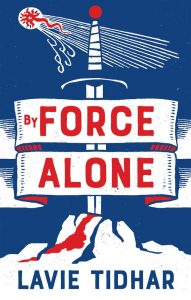 What happened was that writers started adding bits to it, mostly, ironically, French and German writers. So this great British myth is firstly about the defeat of the Brits, and secondly written by foreigners. So someone added Camelot, someone added the Round Table, at some point some German guy came up with the Holy Grail, because nothing happens in the middle of the story. The Holy Grail goes through a couple of variations. So I got interested in the fact that firstly, this was essentially the first shared world fan-fiction project in a way, and the second thing I realised, the thing about Arthurian stories is they emerge out of nationalistic need. Geoffrey is writing them for a specific reason, but they pretty much go forgotten for three centuries or so. Thomas Malory, who was a horrible person, he was a murderer and a rapist and an embezzler, he brings them back. He brings Le Morte d’Arthur (1485) at the time of Elizabethan Golden Age British Empire rising. [Editor’s note: 1485 marked the culmination of the War of the Roses with Henry VII’s victory at Bosworth, but Lavie’s point still stands. Henry VII named his first-born son Arthur, and Arthur’s successor, his brother Henry VIII, was also very keen on Arthurian legend] And again after that they kind of lie forgotten until the Victorians discover them during the time of Empire and bring them back. So Arthur really is kind of in Avalon waiting for the call of British nationalism to come back.
What happened was that writers started adding bits to it, mostly, ironically, French and German writers. So this great British myth is firstly about the defeat of the Brits, and secondly written by foreigners. So someone added Camelot, someone added the Round Table, at some point some German guy came up with the Holy Grail, because nothing happens in the middle of the story. The Holy Grail goes through a couple of variations. So I got interested in the fact that firstly, this was essentially the first shared world fan-fiction project in a way, and the second thing I realised, the thing about Arthurian stories is they emerge out of nationalistic need. Geoffrey is writing them for a specific reason, but they pretty much go forgotten for three centuries or so. Thomas Malory, who was a horrible person, he was a murderer and a rapist and an embezzler, he brings them back. He brings Le Morte d’Arthur (1485) at the time of Elizabethan Golden Age British Empire rising. [Editor’s note: 1485 marked the culmination of the War of the Roses with Henry VII’s victory at Bosworth, but Lavie’s point still stands. Henry VII named his first-born son Arthur, and Arthur’s successor, his brother Henry VIII, was also very keen on Arthurian legend] And again after that they kind of lie forgotten until the Victorians discover them during the time of Empire and bring them back. So Arthur really is kind of in Avalon waiting for the call of British nationalism to come back.
I started looking at the story, and what drove me insane is that everybody thinks they’re all about chivalry. But if you read the actual fucking story, it’s about a guy who murders all his rivals to become the king. His wife cheats on him with his best guy, then his nephew rises up and kills him. That’s it. There’s nothing chivalrous about any of this. It’s a horrible story of bloodshed! And I thought, that’s insane.
So I started looking around and saying, surely someone has actually pointed that out, surely someone has written a version where there’s no Arthurian chivalry and how great it all is and the golden age and how everything was better in the old days. Surely they can see what the actual story is, and I couldn’t see that anyone’s done it. I thought well fuck it, I’m going to do it.
I wrote the first section, which is ‘The Rise and Fall of Uther Pendragon’, in like a white heat. I knew I had a deadline to do it because I had to go to Singapore for a writer’s festival, so I had to finish it. I was only doing it for myself, no one knew I was doing it. I wrote that section, went to Singapore, had a great time, came back, and went – well, what do I do now? And so for the next year and a half or so, I would write this in sections, and I would write one section and kind of figure out the next.
And one of the funnier things that happened, I don’t know if I should be mentioning it, but very early on I had chats with a large publisher, and they said, yeah we love everything about you, and this sounds great. I sent them the first section of the book, like a rough synopsis because I didn’t really know what was going on. They came back and they actually said we can’t publish this because the sales people say, readers want the warmth and nostalgia of the original text. Which was exactly kind of my point. Effectively people want Brexit! And I wasn’t very surprised at this point. But it tickled me enough that I wrote that into the book. And there’s a section where Galahad was trying to explain all of this to these aliens, and he goes, you don’t understand, it’s all about the warmth and nos-fucking-talgia, and the aliens are like well we don’t understand, this is a horrible story. There’s nothing noble about this. Uther rapes Igraine in order for Arthur to be born. So I just went fuck it I’m just going to write the book that I want to write, and the funny thing is when it went on submission, pretty much every editor that got it kind of said, the one thing I never want to see is another King Arthur submission, oh this isn’t another King Arthur submission. This is something different, and they really liked it. So that was kind of nice, that doesn’t always happen. So yeah, that was how the book started.
That weird nostalgia for Brexit nationalism comes into the book, there’s a scene where Merlin is working up the crowd into xenophobic hatred. Was the idea to intentionally reflect Britain’s own problem with its self image?
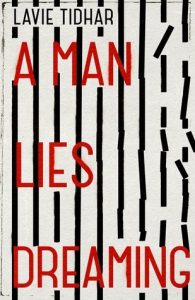 Yeah I mean obviously it reflects the times. Basically it ties in to writing A Man Lies Dreaming, which is a book I wrote when I came back to the UK in 2011 and felt that undercurrent of nationalism, anger and the right wing element that, very much I think to this day resembles Germany in the 1930s. A Man Lies Dreaming was written before Brexit and Trump, and seems to have kind of predicted the rise of the far right. I think the speech Oswald Mosley gives in the end is pretty much the speech Nigel Farage gave in real life once Brexit happened. And then of course Trump, although you couldn’t make the stuff up. I think the experience of reading A Man Lies Dreaming pre-Brexit and Trump and post-Brexit and Trump is such a different experience, because it almost feels like a book that was written after the fact. When I was writing Oswald Mosley’s speech in A Man Lies Dreaming, that was a mixture of Cameron’s sentences that don’t actually say anything, mixed in with a bit of Hitler, and it was really effective. And the thing about Merlin is, he doesn’t actually believe any of this shit, but he’s using it. He’s kind of like a modern politician. So he’s giving these horrible speeches about foreigners coming over here, taking our jobs, taking our women, and of course the irony is in all this time the story is about the Anglo-Saxons coming over who then become the English, who then complain about the Normans coming, which eventually leads us to Britain today. This notion of Britishness doesn’t owe anything to actual history, it’s made of some Germanic tribes, some Celts, and French people. It’s the most bizarre thing. So yeah, it’s very much about today.
Yeah I mean obviously it reflects the times. Basically it ties in to writing A Man Lies Dreaming, which is a book I wrote when I came back to the UK in 2011 and felt that undercurrent of nationalism, anger and the right wing element that, very much I think to this day resembles Germany in the 1930s. A Man Lies Dreaming was written before Brexit and Trump, and seems to have kind of predicted the rise of the far right. I think the speech Oswald Mosley gives in the end is pretty much the speech Nigel Farage gave in real life once Brexit happened. And then of course Trump, although you couldn’t make the stuff up. I think the experience of reading A Man Lies Dreaming pre-Brexit and Trump and post-Brexit and Trump is such a different experience, because it almost feels like a book that was written after the fact. When I was writing Oswald Mosley’s speech in A Man Lies Dreaming, that was a mixture of Cameron’s sentences that don’t actually say anything, mixed in with a bit of Hitler, and it was really effective. And the thing about Merlin is, he doesn’t actually believe any of this shit, but he’s using it. He’s kind of like a modern politician. So he’s giving these horrible speeches about foreigners coming over here, taking our jobs, taking our women, and of course the irony is in all this time the story is about the Anglo-Saxons coming over who then become the English, who then complain about the Normans coming, which eventually leads us to Britain today. This notion of Britishness doesn’t owe anything to actual history, it’s made of some Germanic tribes, some Celts, and French people. It’s the most bizarre thing. So yeah, it’s very much about today.
You use the fantastic or alternate history, or noir or SFnal, tropes to look at unpleasant political realities that people would rather look away from. What is it about these pulp fiction tropes that lend themselves to tackling these big themes?
Partly it’s just stuff I like. I think what genre does, it manages to make difficult things – it’s a horrible thing to say – but if you can have fun doing it, it’s a bit more entertaining to read. I love detectives, and kung fu, and all that kind of stuff. But also I find genres really interesting because they impose a certain formula and a certain set of rules and certain set of expectations. And that’s something you can play with. I had great fun in A Man Lies Dreaming parodying Raymond Chandler repeatedly throughout the book, which I don’t know how many people got that. But the whole book is a correspondence with Raymond Chandler and his laws of detecting. Detective fiction is all about establishing order at the end of the day, it’s maintaining the status quo. I just use what I have.
I’m a 21st century writer, so I don’t come from a tradition of really distinguishing necessarily when we’re doing these things, so I’ll just take whatever I want, I’ll take crime, I’ll take fantasy, I’ll borrow Chinese kung fu tropes. And the nice thing with something like By Force Alone is that I could write sections in different genres almost. I get to write my kung fu, my wuxia section, but with Lancelot doing kung fu ,which I was so looking forward to writing, but I had to write 70,000 words before I could get to it. I get to do the Grail Quest as Roadside Picnic (1972) by the Strugatsky brothers, which I love, and I get to do gangsters which I love, I get to combine all these things. And it’s very weird, people don’t necessarily always kind of want that. I think that’s something that increasingly characterises 21st century writing in general, is that these genres are artificial. In the 19th century, people were just writing fiction and they didn’t really care if you suddenly introduced a ghost into an otherwise realistic story. And the 20th century comes splintered into so many subgenres with their own rules. Now we’re kind of going back to a sort of Victorian mode, but we’re just gonna use whatever works. All fiction is ultimately fiction. And realist fiction is just as much a fantastical construct as if you introduce dragons or aliens into it. Which, I did both.
This month you also have Adler being released from Titan Comics with art by Paul McCaffrey. Would you be able to tell us a bit about that?
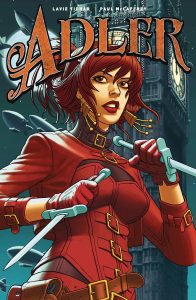 Again most of what I write comes from hate of something, from being disgruntled. Because I’m a huge Sherlock Holmes fan, I got really annoyed when I tried to watch the TV show; and when I watched the first movie they made, I hated the way they did it. I hated what they did to Irene Adler, who’s a really good character. You never see her very well, but she’s a really cool character in the books. And so I thought, oh well I’m going to show them, and I ended up writing a movie script of Adler as the hero, she’s having this steampunk adventure. Then I left it on the hard drive because what was I supposed to do with this thing!
Again most of what I write comes from hate of something, from being disgruntled. Because I’m a huge Sherlock Holmes fan, I got really annoyed when I tried to watch the TV show; and when I watched the first movie they made, I hated the way they did it. I hated what they did to Irene Adler, who’s a really good character. You never see her very well, but she’s a really cool character in the books. And so I thought, oh well I’m going to show them, and I ended up writing a movie script of Adler as the hero, she’s having this steampunk adventure. Then I left it on the hard drive because what was I supposed to do with this thing!
I’d been doing small press comics with Paul, who I worked with on a book called Going To The Moon (2012), which is my favourite thing that I’ve ever done but thirty people have read it. Titan comics wanted to work with Paul, and I basically jumped on Paul’s bandwagon, I was like, if you want Paul you have to go through me! So we pitched them The Violent Century, because I didn’t think I was going to sell The Violent Century. This was back in like 2012. And they were like, yeah The Violent Century sounds great. So somewhere on my hard drive there’s this script for The Violent Century issue one and three pages of art. But the problem was I sold the book about a week after that conversation. And Titan went, well we don’t want to buy a novelisation, we want an original property. So literally I kind of went, what else have I got on my hard drive, what about this Adler thing? It’s like the League of Extraordinary Gentlemen, which is the easiest way to pitch it. And they were like yeah that sounds great. So they literally bought it without a script, with like one piece of art I think, and then I wrote it.
It’s about Irene Adler, and a bunch of other characters from Victorian literature, having a steampunky sort of adventure. Paul, because he draws by hand, and he’s done everything himself, he’s done the colouring, it’s just taken a very very long time. It got announced in San Diego ComicCon in 2013 and it’s coming out in 2020. I mean to be fair, most of my work involves sending Paul death threats every month. Where is my comic?! And he’s like well I’ve just finished another panel.
The other funny thing that happened is that in the meantime, Titan stole Paul to work on Kim Newman’s Anno Dracula. And the thing is I couldn’t get pissed off with Kim Newman because I stole everything he does in Anno Dracula for Adler. So, it was kind of like tit for tat. I’m a huge fan of Anno Dracula and what Kim does, we’re basically yeah, we’re working with the same tools. But the comparisons to Alan Moore for example, yes of course they’re there, but everyone’s been doing that in a certain level. My influences are much more people like Kim Newman, Tim Powers. The use of real and fictional characters in a new setting. It wasn’t written just to be a fun thing, it was meant to be something closer to my Bookman books. And I said to Paul, you know if I realised it would have taken seven years to do this, I would have written you a masterpiece! It’s a cool comic, I think. I’m going to get a lot of hate tweets. I’ve already been getting hate tweets about this comic.
The Tim Powers comparison is interesting because you do use fictional characters and real characters in real historical settings and mix them together. Do you feel when you’re using other people’s characters or historical characters that there’s a baggage that comes with them that you need to negotiate?
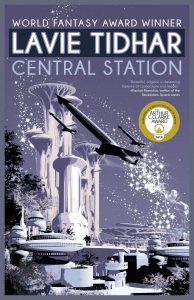 It’s easier for me because what I’m doing is I’m not using other people’s cultures, I’m using British people’s cultures, and I feel entirely justified in taking that. Because I come from the colonised bit. So I have no shame in doing whatever I want with the British ones. I’d be very reluctant to go after someone else. And in fact I kind of feel bad because a part of me thinks, rather than wasting my time writing about King Arthur or Irene Adler, I should be writing the more personal stuff. I should be writing about where I come from, like with Central Station, which is a very personal, very close to home book. But it’s tricky, it’s very tough. Firstly you do have something to say, certainly the British are fair game, but you do maybe want to alternate. But then you don’t want to get pigeonholed as well.
It’s easier for me because what I’m doing is I’m not using other people’s cultures, I’m using British people’s cultures, and I feel entirely justified in taking that. Because I come from the colonised bit. So I have no shame in doing whatever I want with the British ones. I’d be very reluctant to go after someone else. And in fact I kind of feel bad because a part of me thinks, rather than wasting my time writing about King Arthur or Irene Adler, I should be writing the more personal stuff. I should be writing about where I come from, like with Central Station, which is a very personal, very close to home book. But it’s tricky, it’s very tough. Firstly you do have something to say, certainly the British are fair game, but you do maybe want to alternate. But then you don’t want to get pigeonholed as well.
For a long time I was ignored by any Jewish magazines or anything, and suddenly, which startled me, I was doing the Jewish stuff. And I don’t want to be a Jewish writer, I just want to be a writer. It’s also weird because I write so many genres. I was up for the Crime Writers Association Dagger award last year. So sometimes I get called a fantasy writer, sometimes I get called a science fiction writer, sometimes I get called a political writer – it’s just a writer! I don’t come from this place where you write the one thing and you have to stay with it, you just write stuff. Some of it fits neatly into some boxes, some of it doesn’t.
Your novel Unholy Land came out last year with Tachyon, and mixes metafiction with an alternate history where the Jewish state is set up in East Africa. Where did this mix of ideas come from?
I really think of the book as a sort of coda. I wrote Osama, The Violent Century and A Man Lies Dreaming and I think Unholy Land is kind of like the coda to those three books. The new books that are coming out, By Force Alone and The Escapement, are very very different. I’ve moved on. These books were kind of doing the political alternate history noir thing, you know, its own genre. Its own very specific mini-genre! And Unholy Land kind of just takes it to the extreme. I mean it’s been up for like five awards and its reviews have been very good, but no one actually read it I think, and I can’t necessarily blame them. It’s a book that doesn’t give a shit in some ways, it just says well I’m going to do my thing. So it does the metafiction, it comments on itself. Which is what the other books have done but not as explicitly. It talks about how detective fiction works, how we construct reality. The whole book is really about how we construct the reality we see through fiction. The whole Israel/Palestine thing is fascinating, because it is the same place, the same location, the same geography, told by two different people in a very different way. I thought, that’s fascinating. And China Mieville did it very well with The City And The City, but that’s not to say no one else should tackle it.
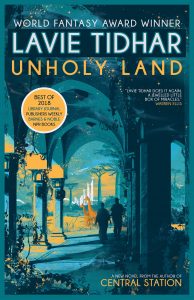 The Uganda plan was something I wrote about back in 2008 I think, in a short novelette. I wanted to go back to where you see a tiny bit of the Uganda from Unholy Land in that story, just for a minute in a timeslip, and we see it and we see the terrorist attack that we see in the book, so I always wanted to revisit it. Ironically there’s also an Israeli novel that came out around the same time in the last few years, Herzl Said by Yoav Avni (2011), that starts off in a Jewish Uganda, and then moves to the alternate history Palestine where it’s never been settled by Jews. And that’s intriguing, it’s a very good book. It was an interesting book, and I think the guy who wrote it was a bit taken aback when my book came out, and he was like, well I’ve done Uganda, and I was like well actually I did do that first! But also they’re just very different. Also the construction of the world is different. One of the things that interested me was how people construct those alternate realities, and Yoav’s version was basically transplanting his modern day Israel to Africa. If you look at The Yiddish Policeman’s Union, it’s pretty much American Jews in Alaska. And I wanted to look at how do you construct this reality where they’re not the same people, how would they have evolved differently? So I paid attention to things like the language is different, it’s not quite Yiddish, it’s not quite Hebrew, both are African languages, you know the names of places, a lot of it. And I drew on my own experience of having lived in South Africa for a long time and stuff.
The Uganda plan was something I wrote about back in 2008 I think, in a short novelette. I wanted to go back to where you see a tiny bit of the Uganda from Unholy Land in that story, just for a minute in a timeslip, and we see it and we see the terrorist attack that we see in the book, so I always wanted to revisit it. Ironically there’s also an Israeli novel that came out around the same time in the last few years, Herzl Said by Yoav Avni (2011), that starts off in a Jewish Uganda, and then moves to the alternate history Palestine where it’s never been settled by Jews. And that’s intriguing, it’s a very good book. It was an interesting book, and I think the guy who wrote it was a bit taken aback when my book came out, and he was like, well I’ve done Uganda, and I was like well actually I did do that first! But also they’re just very different. Also the construction of the world is different. One of the things that interested me was how people construct those alternate realities, and Yoav’s version was basically transplanting his modern day Israel to Africa. If you look at The Yiddish Policeman’s Union, it’s pretty much American Jews in Alaska. And I wanted to look at how do you construct this reality where they’re not the same people, how would they have evolved differently? So I paid attention to things like the language is different, it’s not quite Yiddish, it’s not quite Hebrew, both are African languages, you know the names of places, a lot of it. And I drew on my own experience of having lived in South Africa for a long time and stuff.
Your middle grade novel Candy came out that same year..
I think of Candy as basically A Man Lies Dreaming, just minus Hitler. It shares the same DNA. I think the editing was interesting, because the eventual book is very different in a way from my own vision for it. I had to then edit it for the way children’s books are supposed to be written today, which I don’t necessarily agree with, but I want to get paid. It was an interesting process. Some of it was like speeding up the ending a little more, paging the villain, a lot more stopping and reflecting on what’s happened. But essentially I do think it’s in exactly the same vein as A Man Lies Dreaming, and it’s got the same sort of darkness underneath and the same humour. It’s got a lot of humour in it. But it turns out that me writing children’s books is just as problematic as me writing adults’ books. So my life hasn’t become any easier!
That strain of dark humour comes through all your work, even when dealing with particularly difficult subjects. What is it about that kind of humour that’s so central to what you do?
It’s dark humour, but I grew up with the holocaust. And the thing about it is that people came out of it, people were making jokes when they were in the death camps. People say they made jokes when they came out. And my problem is that I’ve got friends who write these books that are dark. They’re a bit like Garth Marenghi. “It was dark, dark, dark, lots of blood.” And if it’s just dark all the time, you don’t care. Or at least I don’t care. The humour is there to make the darkness real. Because that’s how we deal with stuff. And I come from a place that has very black humour, nothing’s sacred. The only jokes are holocaust jokes. But I hate books that are bleak. You need the humour, you need the hope, even in the worst situation. I also really like bad jokes!
As well as writing, you’ve done a lot of editing work, like the Jews vs Zombies, Jews vs Aliens series with Rebecca Levene (2015), and you did the first couple of volumes of The Apex Book of World SF anthologies (2009). How did you come to editing?
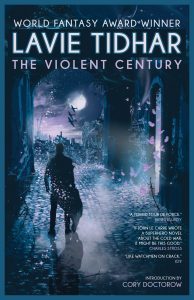 Yeah, I did five world SF anthologies. It’s a hobby, I think everyone needs a hobby. And I decided to get a hobby now, with photography, that’s my new hobby. The world sf stuff came out of me being frustrated with being an international writer and no one giving a shit at various turns, and trying to do something about it for everyone, not just for me. Despite the odds and despite no one really caring. The irony is that of course now I’ve become part of the establishment. I repeatedly see myself referred to as the status quo, the establishment, I’m like that’s a very strange thing to say to a person who grew up on a kibbutz in Israel writing English as a second language, I had absolutely no access to any of this anglophone publishing. But at the same time, yeah fair enough, I have a certain privilege being white enough and male and so on. But that’s where it came from, it came from that desire to promote international speculative fiction. Jews versus Zombies, we were in the pub and it just sounded like a good idea! I think we literally got people to write us by drunkenly cornering them in corridors and saying to them, are you sort of Jewish? How Jewish are you? You’re Jewish enough. Adam Roberts has married into the tribe, we were like fine you can do it. We don’t discriminate.
Yeah, I did five world SF anthologies. It’s a hobby, I think everyone needs a hobby. And I decided to get a hobby now, with photography, that’s my new hobby. The world sf stuff came out of me being frustrated with being an international writer and no one giving a shit at various turns, and trying to do something about it for everyone, not just for me. Despite the odds and despite no one really caring. The irony is that of course now I’ve become part of the establishment. I repeatedly see myself referred to as the status quo, the establishment, I’m like that’s a very strange thing to say to a person who grew up on a kibbutz in Israel writing English as a second language, I had absolutely no access to any of this anglophone publishing. But at the same time, yeah fair enough, I have a certain privilege being white enough and male and so on. But that’s where it came from, it came from that desire to promote international speculative fiction. Jews versus Zombies, we were in the pub and it just sounded like a good idea! I think we literally got people to write us by drunkenly cornering them in corridors and saying to them, are you sort of Jewish? How Jewish are you? You’re Jewish enough. Adam Roberts has married into the tribe, we were like fine you can do it. We don’t discriminate.
Editing is interesting, it’s also frustrating, it’s difficult, it’s dealing with writers, and as it turns out, I hate writers. As an editor I hate them. You’re always going to get a diva or two. And I realise the irony of me saying that. I imagine that’s how people talk about me when they say, I hate dealing with writers. Because as an editor, you’re dealing with a lot of people and all you want is the least amount of hassle. You just want to say, yes, no, sign the contract. And there’s always someone who’s going to start, oh but clause… you know you’re not James Pitt. It’s easy enough, just say no and I’ll move onto the next one. So it’s an interesting process. Sometimes you’re asking, if you’re commissioning original stories and people don’t quite give you what you want, how much do you edit? It’s not something I would make a career out of but there’s something very addictive about doing anthologies. Because it gives you the opportunity to champion other people’s work. In a way it’s kind of like the fact that I now have a book column in the Washington Post, which is insane. And I get to be nice and just say nice things about people’s books. Which is amazing, and I get paid for it. Because I think my natural instinct would be to be very mean about people’s work, but here I’m getting paid to actually say nice things, and I kind of feel like karmically, you know, it balances the rest of my otherwise toxic ways!
You mentioned The Escapement earlier, which will be coming out with Tachyon, and you have The Big Blind also coming out later this year from PS Publishing, would you be able to tell us a little bit about them?
I’m told I should not describe The Escapement the way I’ve been describing it. I’ve been describing it as a clown western. As it turns out, no one likes clowns. People in publishing really run a mile if you mention clowns. So I can’t say it’s a clown western. It’s a weird book, I was trying to write a really simple book. I was like, I’m going to write a western, with clowns. And it became very weird. It’s a surrealist fantasy that is sort of like a fairy tale. It’s about a father who’s searching for a cure for his child’s illness across a secondary world fantasy. But you know, maybe there’s a clown or two! There’s even a map. But I think it’s really great. Again it’s a book that’s about the relationship between fiction and fantasy and can you escape into fantasy. But it’s different to the stuff I’ve done before.
The Big Blind’s not genre at all. The Big Blind is about an Irish nun playing poker. I call it Sister Act meets Rounders. So it’s about a young Irish nun whose dad was a famous poker player, and she’s very good at poker but she wants to become a nun, and she has to save her convent from financial ruin by entering the European poker championship and winning. It’s a novella, but again there’s nothing fantastical about it at all, and I love poker purely as a spectator, I can’t play it for shit. But yeah I think it’s great. But then you know I’m easily pleased, I like all of the things I do! Plus Candy’s coming out in America, as The Candy Mafia, plus maybe this anthology that I’ll be doing, so yeah, it’s kind of a busy year. And now I’m deep into writing my Robin Hood of course.
Thank you Lavie Tidhar for speaking with us!
